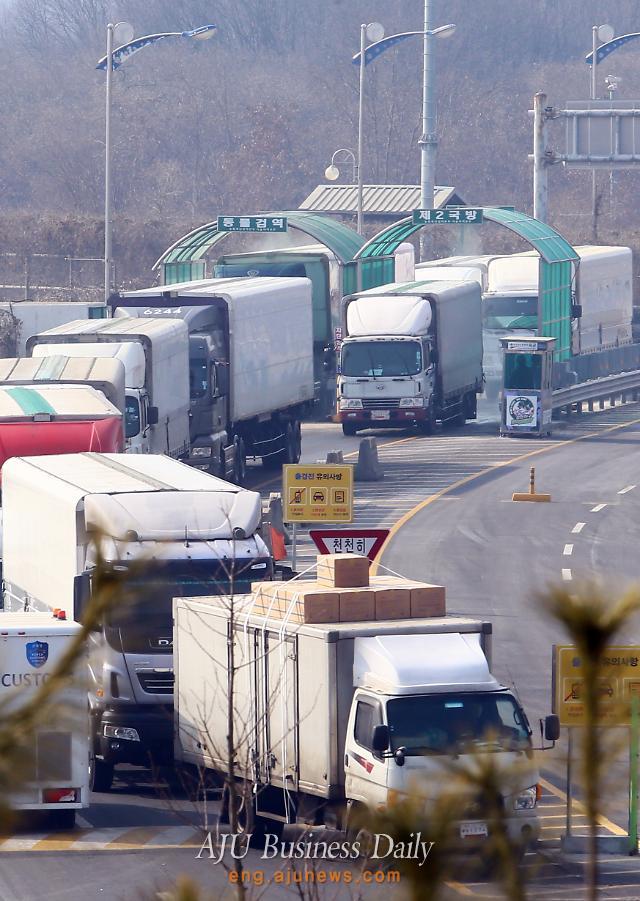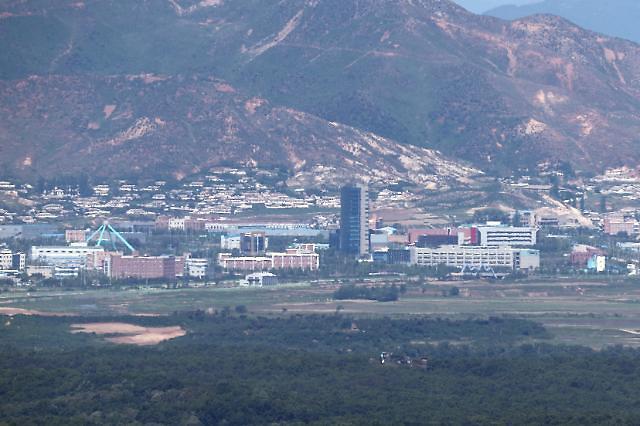
Trucks exiting Kaesung Industrial Park are moving through customs area located at a border between the South Korea and the North[Photo by Namkung Jin-woong = timeid@]
The shutdown of Kaesong, the last major remaining symbol of inter-Korean cooperation, underlines South Korean President Park Geun-hye's determination to tame the North Korean regime, but analysts saw it as an ineffective misstep.
Park probably thinks that losing the Kaesong industrial zone will be one sure way to threaten the survival of the regime under North Korea's young leader Kim Jong-un as the cash-strapped nation makes more than $100 million annually in wages earned by North Korean workers there.
The number of South Korean personnel staying at the complex has been gradually reduced since North Korea's nuclear test on January 6, an indication that Park has thought of closing it well before Pyongyang's defiant rocket launch this week.
The inter-Korean industrial estate, which lies just 10 kilometers (six miles) over the border in the North, hosts about 120 South Korean firms employing some 54,000 North Korean workers.
Seoul officials said the shutdown, announced on Wednesday, would cause minor damage to South Korea's economy in consideration of 469 million US dollars in annual production South Korean firms in Kaesong produced in 2014. The amount accounts for 0.04 percent of South Korea's GDP.
For North Korea, they said the impact would be bigger because it will have to take care of the livelihood of more than 200,000 people, including jobless workers and their families.
But Yang Moo-Jin, a North Korean expert and professor at the University of North Korean Studies, cast doubt over the effectiveness of Seoul's punitive action.
"For South Korea, it's a clear misstep and will create an unfavorable outcome itself," Yang told Aju News, predicting South Korea would lose as much as $3.0 billion annually.
The Seoul government's calculation did not include losses inflicted on 5,000 sub-contractors and "invisible" factors such as economic uncertainties to be caused by heightened cross-border tensions, he said.
South Korea's military was put on high alert Thursday as North Korea took retaliatory steps to seal off Kaesong and freeze all assets there, ordering South Korean personnel to leave immediately.
Pyongyang also cut off military hotlines for cross-border communications saying it would turn Kaesong into a military zone. South Korean staff staying in the complex were not allowed to bring out anything but personal belongings.
The joint zone is considered a rare legitimate source of hard currency for the impoverished North. The hard currency wages are kept by the state, which passes on a fraction -- in local currency -- to the workers. So far North Korea has earned a total of 616 billion won.
"Together with financial losses, it will deal a blow to North Korea's ambitious campaign to attract foreign investors, but that's all," Yang said, adding Pyongyang would never give up its nuclear and missile programs.
South Korea's financial watchdog, the Financial Services Commission, said emergency lending would be provided through state-controlled banks to firms operating in the complex. Along with tax breaks, the maturity of loans will be extended with repayment of maturing debts to be rolled over.
In case of a prolonged shutdown, the Seoul government pledged to look for alternative plots of land for them to use.
An association of South Korean firms, which operate in Kaesong to get cheap labor, preferential loans and tax breaks from the government, was worried more about an "irrecoverable" long-term damage to its business.
"Recovering damage to be inflicted on our firms will not be possible in any way," association head Jung Ki-sup said.
Kaesong opened in 2004 and has generally managed to ride out repeated inter-Korean crises, even when every other avenue of cooperation was closed off.
When the industrial park was shut down for nearly five months in 2013, official data showed the firms in Kaesong suffered a combined loss of 707 billion won.
"The answer is clear because it will bring a more painful outcome to South Korea," Dongguk University professor Koh Yu-Hwan said, adding
Pyongyang already has been under an array of economic sanctions.
It will be not easy for South Korea to forget more than one trillion won which has been invested in the complex, he said.
"The shutdown of Kaesong will not be an effective leverage as Pyongyang will not take it so seriously," Koh said.
Furthermore, North Korea will be able to divert experienced workers to other industrial sites at home and abroad and to utilize seized facilities established n Kaesong for its own production, he said.
아주경제 임장원 기자 = cwlim34@ajunews.com



